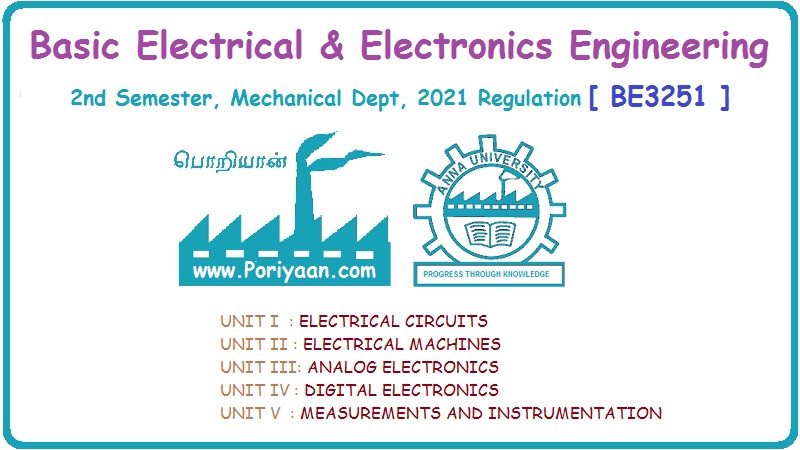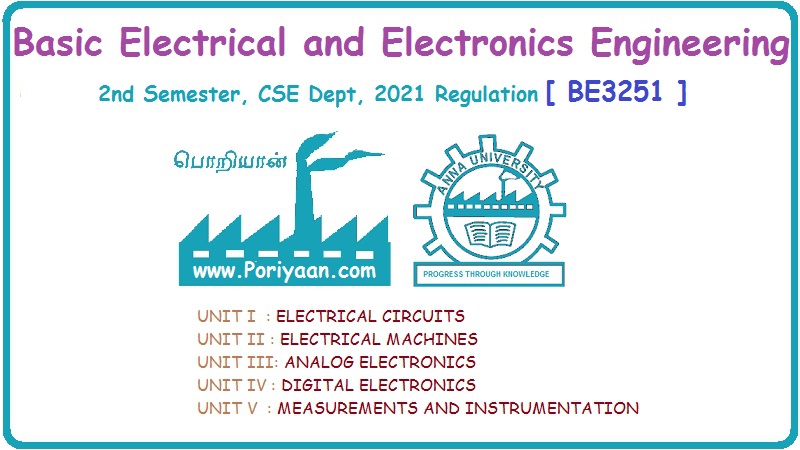Basic Electrical and Electronics Engineering: Unit II: Electrical Machines
Three Phase Transformer Star and Delta Configurations
A three phase transformer has three sets of primary and secondary windings.
THREE
PHASE TRANSFORMER STAR AND DELTA CONFIGURATIONS
A
three phase transformer has three sets of primary and secondary windings.
Depending upon the windings are interconnection, determines whether the
connection is a star or delta configuration.
The
three available voltages, which themselves are each displaced from the other by
120 electrical degrees
With
three single-phase transformers connected together, the magnetic flux's in the
three transformers differ in phase by 120 time-degrees. With a single the
three-phase transformer there are three magnetic flux's in the core differing
in time-phase by 120 degrees.
Transformer Star
and Delta Configurations
Symbols
are generally used on a three phase transformer to indicate the type or types
of connections used with upper case Y for star connected, D for delta connected
and Z for interconnected star primary windings, with lower case y, d and z for
their respective secondaries. Then, Star-Star would be labelled Yy, Delta-Delta
would be labelled Dd and interconnected star to interconnected star would be Zz
for the same types of connected transformers.
Transformer
Winding Identification
In
which three single-phase transformers may be connected together between their
primary and secondary three-phase circuits. These four standard configurations
are given as: Delta-Delta (Dd), Star-Star (Yy), Star-Delta (Yd), and Delta-Star
(Dy).
Transformers
for high voltage operation with the star connections has the advantage of
reducing the voltage on an individual transformer, reducing the number of turns
required and an increase in the size of the conductors, making the coil
windings easier and cheaper to insulate than delta transformers.
The
delta-delta connection nevertheless has one big advantage over the star-delta
configuration, in that if one transformer of a group of three should become
faulty or disabled, the two remaining ones will continue to deliver three-phase
power with a capacity equal to approximately two thirds of the original output
from the transformer unit.
Transformer
Delta and Delta Connections
In
a delta connected (Dd) group of transformers, the line voltage, VL
is equal to the supply voltage, VL = VS. But the current
in each phase winding is given as: 1/√3 × IL of the line current,
where IL is the line current.
One
disadvantage of delta connected three phase transformers is that each
transformer must be wound for the full-line voltage, (in our example above
100V) and for 57.7 per cent, line current. The greater number of turns in the
winding, together with the insulation between turns, necessitate a larger and
more expensive coil than the star connection. Another disadvantage with delta
connected three phase transformers is that there is no "neutral" or common
connection.
In
the star-star arrangement (Yy), (wye-wye), each transformer has one terminal
connected to a common junction, or neutral point with the three remaining ends
of the primary windings connected to the three-phase mains supply. The number of
turns in a transformer winding for star connection is 57.7 per cent, of that
required for delta connection.
The
star connection requires the use of three transformers, and if any one
transformer becomes fault or disabled, the whole group might become disabled.
Nevertheless, the star connected three phase transformer is especially
convenient and economical in electrical power distributing systems, in that a
fourth wire may be connected as a neutral point, (n) of the three star
connected secondaries as shown
Transformer
Star and Star Connections
The
voltage between any line of the three-phase transformer is called the
"line voltage", VL, while the voltage between any line and
the neutral point of a star connected transformer is called the "phase
voltage", Vp. This phase voltage between the neutral point and
any one of the line connections is 1/√3 × VL of the line voltage.
Then
above, the primary side phase voltage, Vp is given as.
VP
= 1/√3 × VL
The
secondary current in each phase of a star-connected group of transformers is
the same as that for the line current of the supply, then IL = IS.
Then
the relationship between line and phase voltages and currents in a three- phase
system can be summarised as:
Basic Electrical and Electronics Engineering: Unit II: Electrical Machines : Tag: : - Three Phase Transformer Star and Delta Configurations
Related Topics
Related Subjects
Basic Electrical and Electronics Engineering
BE3251 2nd semester Mechanical Dept | 2021 Regulation | 2nd Semester Mechanical Dept 2021 Regulation
Basic Electrical and Electronics Engineering
BE3251 2nd Semester CSE Dept 2021 | Regulation | 2nd Semester CSE Dept 2021 Regulation

